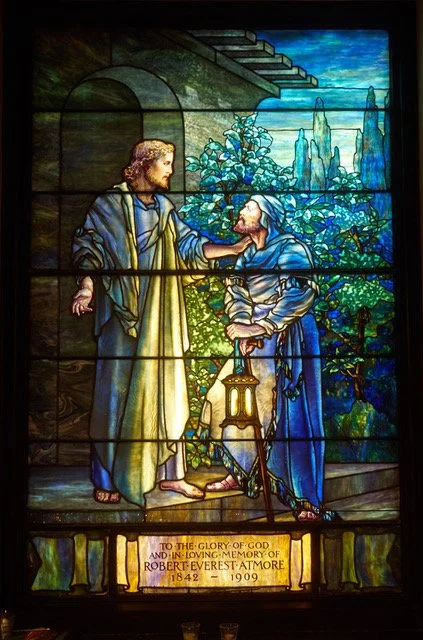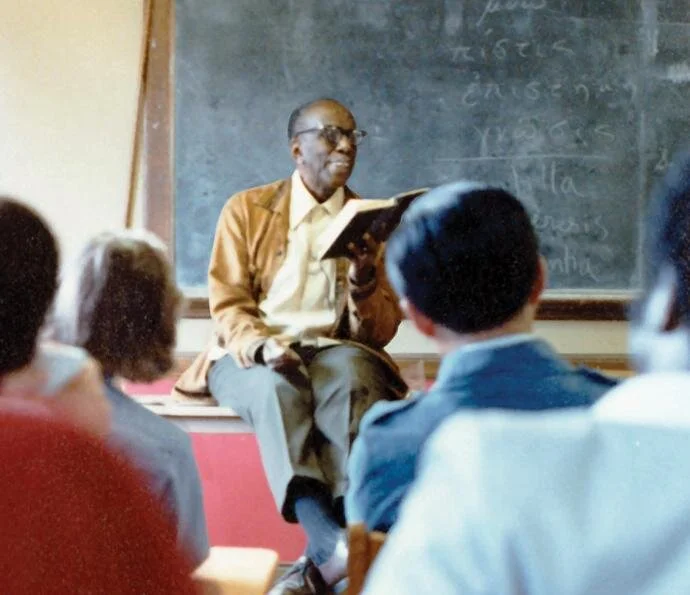On the Beatitudes and Living in the Here and Now: Part Three—Continuing on the Way to Advent
“…Living the Beatitudes is… living as the chosen people of God. We can walk through our violent and fear-filled world with heads erect, confident that God is our guide and will fulfill the deepest desires of our hearts.”
I. Henri Nouwen’s notion that we live as chosen people of God if we live the Beatitudes has particular relevance as we consider here the second set of four Beatitudes (5-8). These beatitudes amplify the “blessed are” of Jesus’ words. They represent Jesus’ recognition that in our practice of mercy, purity of heart, peace, and righteousness, we are following his way. I wonder, though, if this is too simple an explanation, especially if we consider the challenges of the past eighteen months, especially the way people have become so much more preoccupied with themselves.
Nouwen at l’Arche Daybreak Community
II. The trauma we have all endured in these many months, traumas of different shapes, sizes, and types, traumas of life and death and seemingly endless illness and suffering, not to mention the explosions of hatred, greed, violence, racism, sexism, environmental destruction, ignorance--and, yes, stupidity-- have shaken us to our very core. We wonder, probably more than we care to admit, where God might be hiding or whether He’s not paying attention. As strong as our faith may be, it’s often hard to feel otherwise. Here, let’s give ourselves the benefit of the doubt that we have been trying to live the Beatitudes as best we can and from that vantage point, we could take guidance from what we know in Scripture.
III. One lesson from Scripture that can aid us in our struggles with trauma, our preoccupation with ourselves, and all the burdens and grief that are part of them, comes in the Gospel lesson from this past Sunday (October 31), the 23rd Sunday after Pentecost. This would be the passage from Mark 12: 28-34, the well-known “Love the Lord your God, Love your neighbor” passage. Recall the setting: one of the lawyers (scribes) from the Temple, came to Jesus and asked him which is the first of the commandments. You remember Jesus’ response: The first is this: Hear, O Israel! The Lord our God is Lord alone! You shall love the Lord your God with all your heart, with all your soul, with all your mind, and with all your strength.
IV. We remember, too, that Jesus said there was a second commandment. The second is this: You shall love your neighbor as yourself. [There is no other commandment greater than these.] As we explore the Beatitudes more fully, this passage from Mark can be very helpful. I say this because of the language Jesus uses in presenting the “second commandment.” Jesus says that we should love our neighbor as ourselves. But what if we don’t love ourselves to begin with? Or what if we love ourselves too much? What if we’re preoccupied with ourselves? These questions have enormous implications. For example, how can we “live as the chosen people of God” if we don’t love ourselves, or are so preoccupied with ourselves and our individual rights and freedoms? And how can we love anyone else if we are so taken up with ourselves? And here is the most shocking implication: how can we love God with all our hearts, our souls, our minds, and our strength if we do not love ourselves, or are so absorbed by our own preoccupations we have a distorted sense of ourselves.
Barbara Brown Taylor
V. The Beatitudes can seem more “real” than loving God, loving our neighbor, and loving ourselves if we understand that the Beatitudes are “practical steps” toward a full embrace of the two great commandments. Episcopal priest, professor and author, Barbara Brown Taylor, has this to say about the “realness” of the Beatitudes:
[The Beatitudes] … “are Jesus’ truth claims for all times, the basis of everything that follows, which everyone who hears them is free to accept, reject, or neglect. Whatever you believe about him, believe this about you: the things that seem to be going most wrong for you may in fact be the things that are going most right. This doesn’t mean that you shouldn’t try to fix them. It just means that they may need blessing as much as they need fixing, since the blessing is already there. If you can breathe into it, --well, that’s when heaven comes to earth, because earth is where heaven starts for all who are willing to live into it right now.”
— From Always a Guest, pp. 203-04
Brown Taylor is pointing to the “second greatest commandment” and, in doing so, is reminding us that we are loved by God and that God’s love is the path to the Beatitudes.
VI. If we can accept that we are blessed and loved by God—Henri Nouwen would remind us that we are the beloved of God—then we have a chance to attend to the “fixing” that Barbara Brown Taylor identifies. But feeling blessed and acknowledging that we are God’s beloved do not come naturally, though some would argue that they ought to. The paradox is that if we can accept that we are God’s beloved and that we are blessed and loved as we are (and this includes the parts of us that need fixing), then we can begin and/or strengthen our love of ourselves and, most importantly, see beyond ourselves. The way to do this comes with the Beatitudes.
VII. This week (the week of October 31-November 6) is the Thirty-First Week in Ordinary Time and there are three weeks left before the First Sunday in Advent and the beginning of the new liturgical year. So, we have three weeks in what we have called the Here and Now of Ordinary Time, the period when we make a special effort to think, speak and live in the presence of God, in other words, to be in God’s presence in everything we do. Ordinary Time is a period of taking stock so that when Advent and the new liturgical year come, we will be prepared to start over with the love of God that comes in the Incarnation.
VIII. Next time (November 19), as we move closer to the first Sunday of Advent on November 28, we will conclude our exploration of the Beatitudes and consider what Advent might have in store for us.
—Father Peter









